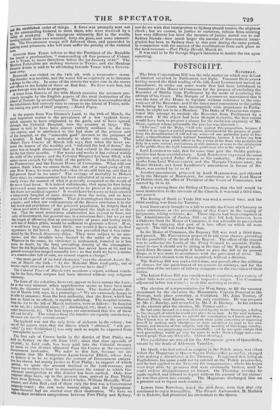POSTSCRIPT.
SATURDAY. The Irish Corporations Bill was the only matter on which any debate of interest occurred in Parliament last night. Viscount Du:seas:sox
having moved the third reading of the bill, Lord LYNIMURST moved an amendment, to strike out some words that had been introduced in Committee of the House of Commons for the purpose of excluding the Recorder of Dublin from Parliament by the mode of regulating the sittings of his Court. The Marquis of LANSDOWNE maintained that it was the duty of the House to legislate without reference to the con- venience of the Recorder ; and if the times most convenient to the public for holding his Courts were incompatible with attendance in Parlia- ment, he ought not to be a Member. The Duke of' WELLINGTON repro- bated this attempt to exclude the Recorder from Parliament by a side-wind. If the object had been thought desirable, the best course would have been to propose a clause for the exclusion expressly of Mr. Shaw, against whom personally the proviso was directed— "1 for one," said the Duke, " will vote against this proposition, because I consider it an unjust, a partial proposition, introduced for the purpose of grati- fying the disinclination—I will not say more—of one particular party in Ire- land': a disinclination wholly without foundation, because I declare my firm belief that there is no public officer in the ssrvice of the State who performs his duty in a more zealous, meritorious, or able manner, or more to the satisfactioa of the public, than the right honourable gentkinan who is the object of it."
Lord Lassoowsas: said, that for some time past the Dublin gaol-de-
liveries had been unsatisfactory. Lord NORMANDY expressed the same opinion ; and quoted Judge Perrin as his authority. After some re- marks from Lord WITARNCLIFFE and the Marquis -Cnaannetinno' the House divided ; and Lord Lyndhurst's aniendment in favour of Mr. Shaw, was carried by 58 to 42 Another amendment, proposed by Lord HADDINGTON, and objected to by the Marquis of NORMANDY, for continuing to the Lord Mayor of Dublin elect, the office of President of the Court of Conscience, was carried by 58 to 39.
After a warning from the Bishop of EXETER, that the bill would be most destructive to the interests of the Church, it was read a third time, and passed.
The Rating of Stock iu Trade Bill was read a second time, and the third reading was fixed for Tuesday.
Lord Ilnovonam brought in a bill to enable the Court of Chancery to make alterations in the proceedings of that Court in the issuing of judgments, taking evidence, Sze. These objects had been comprised in the Administration of Justice Bill : as that bill had, however, been withdrawn from the House of Commons, it was advisable to pass a short measure for carrying that part of it into effect on which all were agreed. The bill was read a first time.
In the House of Commons, the Regency Bill was read a third time,
and passed. Mr. Faesnensan proposed to add some clauses, providing for the possibility of the death of the Regent. The effect of the clauses was to authorize the Lords of the Privy Council to assemble Parlia- ment in case it should not be sitting at the time of the Regent's death. Lord JOHN RUSSELL thought it better to pass the bill in its present shape, as it was more in accordance with the precedent of IMO. Mr. FRESIIVIELD'S clauses were then negatived, without a division.
The Railway Bill was read a third time, and passed, after the addition of clauses for the punishment of trespassers on railways, and for the protection of the servants of railway-companies in the execution of their ditties.
The Infant Felons Bill was considered in Committee, and a variety of other bills were alvanceil on their respective stages. The Commons adjourned before ten o'clock ; to sit this morning at twelve.


























 Previous page
Previous page